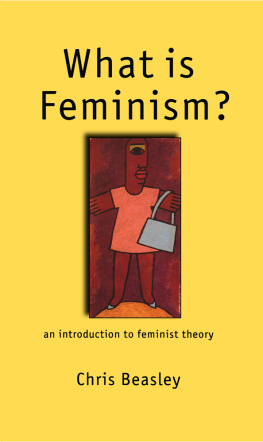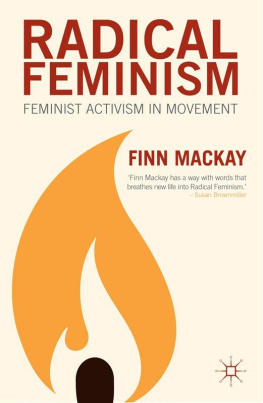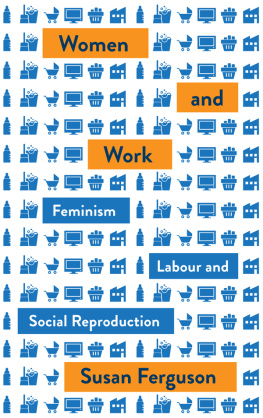MODERN MISOGYNY
MODERN MISOGYNY: ANTI-FEMINISM IN A POST-FEMINIST ERA
Kristin J. Anderson


Oxford University Press is a department of the University of Oxford. It furthers the Universitys objective of excellence in research, scholarship, and education by publishing worldwide.
Oxford New York
Auckland Cape Town Dar es Salaam Hong Kong Karachi
Kuala Lumpur Madrid Melbourne Mexico City Nairobi
New Delhi Shanghai Taipei Toronto
With offices in
Argentina Austria Brazil Chile Czech Republic France Greece
Guatemala Hungary Italy Japan Poland Portugal Singapore
South Korea Switzerland Thailand Turkey Ukraine Vietnam
Oxford is a registered trademark of Oxford University Press in the UK and certain other countries.
Published in the United States of America by
Oxford University Press
198 Madison Avenue, New York, NY 10016
Kristin J. Anderson 2015
All rights reserved. No part of this publication may be reproduced, stored in a retrieval system, or transmitted, in any form or by any means, without the prior permission in writing of Oxford University Press, or as expressly permitted by law, by license, or under terms agreed with the appropriate reproduction rights organization.
Inquiries concerning reproduction outside the scope of the above should be sent to the Rights Department, Oxford University Press, at the address above.
You must not circulate this work in any other form and you must impose this same condition on any acquirer.
Library of Congress Cataloging-in-Publication Data
Anderson, Kristin J., 1967
Modern misogyny : anti-feminism in a post-feminist era / Kristin J. Anderson.
pages cm
Includes index.
ISBN 9780199328178
eISBN: 9780199328192
1. Misogyny. 2. Feminism. I. Title.
HQ1233.A686 2015
305.42dc232014012169
For Alana and Alyssa
CONTENTS
I am grateful to many individuals whose generosity made this work possible. First, I am inestimably indebted to Christina Accomando for her friendship and her political and intellectual guidance over the past two and a half decades. I am a better teacher, writer, and activist because of her patience and persistence (and numerous alliterative suggestions). Over the past two years, it was a consistent pleasure to work with Sean K. OHare, who read the entire manuscript in its many versions and provided assistance with organization, editing, substantive suggestions, and superbly snarky comments in the margins. Over the course of this research and writing, many colleagues provided invaluable feedback on drafts of chapters: Christina Accomando, Bonnie Field, Melinda Kanner, Campbell Leaper, Rachael Robnett, Larissa Smith, and Tammis Thomas, all helped make this a better book. I thank my students at the University of Houston-Downtown whose meticulous work on this project was vital: Sagrario Baca, Kevin Farren, Eynar Hernandez, Lisa Ludtke, Christina Matthews, and Alicia Young. Finally, I am grateful to the following people for their friendship and support: Travis Crone, Shauna Curtis, Bonnie Field, Alex Rossman, Larissa Smith, Cindy Stewart, Fran and Kim Watson, and, most especially, Tammis Thomas.
THE (LACK OF) SIGNIFICANCE OF FEMINISM
A strange phenomenon has accompanied the unprecedented growth of feminist activism around the globe: the recurrent pronouncement of feminisms death. From the 1970s through the new millennium, journalists, academics, and even some feminist scholars have declared the demise of feminism and hailed the advent of the post-feminist age...Given the vibrancy and the variety of proliferating forms of feminist theory and practice, why the premature burial of feminism?
MARY HAWKESWORTH, 2004
Pundits, politicians, and the press have been declaring the demise of feminism since the birth of the womens movement. The feminist postmortem has become so predictable that it even has been dubbed by one feminist critic as False Feminist Death Syndrome. This pernicious media-borne virus...has popped up in print and over the airwaves on and off for decades, poisoning public opinion against the F-word (feminism)progress, the post-feminist argument continues, as evidenced by their numbers in the workforce and in college graduation, surely we have achieved gender equality.
Modern Misogyny examines contemporary sexism and anti-feminism during what has been described as a post-feminist era in the United States and other Western countries. This book critically analyzes the notion that the feminist movement is unnecessary because the work of feminism is complete. From this point of view, women, regardless of their race, social class, sexual orientation, or geography, have achieved equality in most meaningful respects. Feminism is now merely a history lesson. In fact, the argument goes, women have been so successful in achieving equality, it is now men who are victims of gender discrimination. These sentiments make up modern misogyny. Contrary to the claims of the post-feminist punditry, equality has not been achieved. Instead, sexism is now packaged in a more palatable but stealthy form. This book addresses the nature, function, and implications of modern misogyny but also asserts the benefits of a continued feminist movement.
My academic training is in social psychology, and that lens informs the approach to critiquing the myths of modern misogyny. My area of specialization examines subtle, contemporary forms of prejudice and discrimination, and social psychology is particularly well equipped to examine this sort of bias. On the one hand, overt, explicit, and extreme forms of prejudice and discrimination still exist. In fact, the number of hate groups in the United States has increased steadily since the election of President Barack Obama.a group are doing just fine, that feminism has run its course, and that the new victims of sexism are men. This book will demonstrate otherwise by illuminating manifestations of modern misogyny that are harder to see than overt sexism.
Personal anecdotes of discrimination are important in terms of honoring peoples lived experiences, and they can provide vivid and memorable accounts of discrimination. However, personal reports of discrimination can be dismissed by skeptics: Maybe you werent qualified for the job, maybe your interview didnt go wellwhy would you assume sexism played a role? Maybe your boss treats everyone badly? The experimental method is a powerful way to study and detect subtle yet pervasive forms of stereotyping, prejudice, and discrimination. Controlled experiments recreate real-life situations in which discrimination is evidenced often without the perpetrators awareness. For instance, if we create fictitious rsums with standardized qualifications such as education and experience, attach a womans name to some and a mans name to others, and ask people to evaluate the qualifications of otherwise comparable job candidates, we can demonstrate gender discrimination if the participants evaluate the rsums of one gender less favorably than the other gender. If the only difference in the rsum is the name at the top, we must conclude that gender discrimination has occurred, even if the evaluator has not overtly and consciously articulated sexism. In this book, I rely on the vast experimental data in social and cognitive psychology to uncover prejudice and discrimination. At the same time, I use qualitative data in the form of surveys, focus groups, and interviews from psychology, education, and the humanities, which allow individuals to share their experiences, feelings, and attitudes in their own voices.









